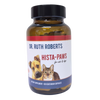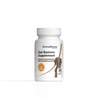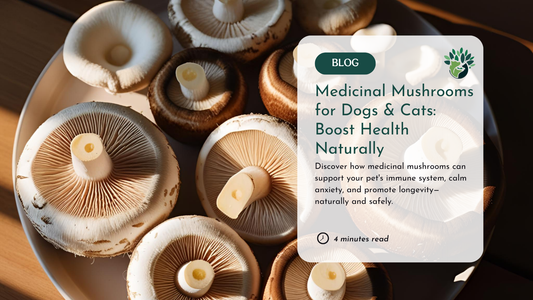The holiday season brings festive meals and family gatherings, but for pet owners, it also comes with the responsibility of ensuring their furry companions stay safe. Dr. Ruth Roberts and certified Holistic Pet Health Coach Marquetta Jefferson shared their expert insights on how to keep pets healthy during the holidays while still letting them enjoy some seasonal treats. Here’s a comprehensive guide to navigating holiday meals with your pets in mind.
Safe Holiday Foods for Pets
While many holiday foods can be dangerous for pets, some are not only safe but also beneficial when prepared correctly. Here’s what you can share with your pets:
1. Turkey (Plain, No Skin)
- What’s Safe: Plain, unseasoned turkey meat without the skin is a great protein source.
- What to Avoid: Turkey skin often contains heavy seasoning, butter, and fat that can upset your pet’s stomach. Cooked turkey bones are a significant hazard, as they can splinter and cause internal injuries.
2. Sweet Potatoes
- What’s Safe: Plain, cooked sweet potatoes are an excellent source of vitamins and fiber.
- What to Avoid: Avoid casseroles or sweet potatoes cooked with added sugar, butter, or marshmallows.
3. Vegetables
- Pet-Friendly Choices: Carrots, celery, spinach, and broccoli are excellent choices.
- Preparation Tip: Serve them cooked and unseasoned for better digestion and to avoid upsetting your pet’s stomach.
4. Mushrooms
- What’s Safe: Store-bought mushrooms like shiitake or lion’s mane, cooked to release their medicinal properties, are highly beneficial for pets.
- What to Avoid: Never feed wild mushrooms unless you are a trained forager, as some can be toxic.
- Pro Tip: Slow-cooking mushrooms enhances their digestibility and nutrient availability.
5. Bone Broth
Bone broth is a nutritional powerhouse for pets, supporting joint health, digestion, and immunity.
- How to Make It: Simmer bones with apple cider vinegar, turmeric, parsley, and ginger for 12-24 hours.
- What to Avoid: Avoid gravies and broths made with high sodium or heavy seasonings.
6. Fruits
- What’s Safe: Blueberries and cranberries are low-glycemic fruits that are safe in moderation and provide antioxidants.
- What to Avoid: Grapes and raisins are highly toxic and can cause kidney failure.
Foods to Avoid Completely
Certain holiday staples can be harmful—even deadly—for pets. Here’s what to keep off their plates:
- Chocolate and Sweets: Xylitol (a common artificial sweetener) is toxic to pets and can cause life-threatening complications.
- Stuffing and Gravy: These often contain onions, garlic, and excessive salt, which can harm pets.
- Cooked Bones: These can splinter and cause internal injuries.
- Alcohol and Caffeine: Both can lead to severe health issues, including vomiting, diarrhea, and seizures.
Managing Pets During Holiday Meals
Pets are naturally curious about food, and the excitement of the holidays can increase the chances of accidental overindulgence. Here’s how to keep them safe and happy:
- Feed Them First: Ensure your pet eats a full meal before the festivities to reduce their temptation to beg or steal food.
- Provide Distractions: Engage pets with puzzle toys or healthy snacks to keep them occupied during meal times.
- Set Boundaries for Guests: Inform family and friends about what foods are off-limits for your pet to prevent accidental feeding.
What to Do in Case of Accidental Consumption
Despite precautions, pets may still sneak a harmful treat. Recognizing the symptoms and acting quickly can make a significant difference.
Signs of Potential Issues:
- Vomiting or diarrhea
- Lethargy or lack of appetite
- Bloated abdomen or signs of discomfort
- Bloody stool or vomit
Steps to Take:
- Mild Cases: Offer water and a bland diet (e.g., plain pumpkin or boiled chicken) to help soothe mild stomach upset.
- Serious Symptoms: Persistent vomiting, blood in the stool, or signs of obstruction warrant an immediate visit to the veterinarian.
Homemade Treat Ideas
Making homemade treats is a safe, cost-effective way to spoil your pets during the holidays.
Dehydrated Snacks:
Slice chicken, beef, or sardines thinly and dehydrate at low heat for several hours to create healthy jerky treats.
Frozen Pumpkin Bites:
Mix plain pumpkin with yogurt, spoon into molds, and freeze for a simple, refreshing snack.
Bone Broth for Kibble Toppers:
Freeze homemade bone broth in small portions and use it as a topper for kibble, adding essential nutrients and hydration.
Balanced Nutrition and Rotational Diets
Marquetta emphasized the importance of balanced nutrition, especially for pets on home-cooked diets. While many pet parents may default to basic chicken and rice, she stressed the need for variety and balance to prevent nutritional deficiencies over time.
Rotational Diet Benefits:
- Improved Gut Health: Introducing diverse ingredients builds a stronger immune system.
- Reduced Sensitivities: Changing protein and vegetable sources prevents the development of food sensitivities.
Tools for Addressing Food Sensitivities
Food sensitivities and allergies can complicate your pet’s diet. Marquetta recommends tools like the Glacier Peaks Pet Wellness Scan, an at-home hair and saliva test. This affordable option helps pet parents identify specific food sensitivities, enabling them to design tailored diets for their pets.
Conclusion
The holidays can be a wonderful time to share joy with your pets, but it’s essential to remain vigilant about what they eat. By focusing on safe, natural foods and avoiding common hazards, you can keep your pets healthy and happy throughout the festive season.
Whether it’s creating homemade treats, preparing a balanced holiday plate, or identifying sensitivities through testing, taking proactive steps ensures your furry friends can safely join in the celebrations. For more tips, recipes, and resources, visit Dr. Ruth Roberts’ website or reach out to certified coaches like Marquetta Jefferson for personalized guidance.
Let’s make this holiday season memorable and safe for all family members—human and animal alike!















